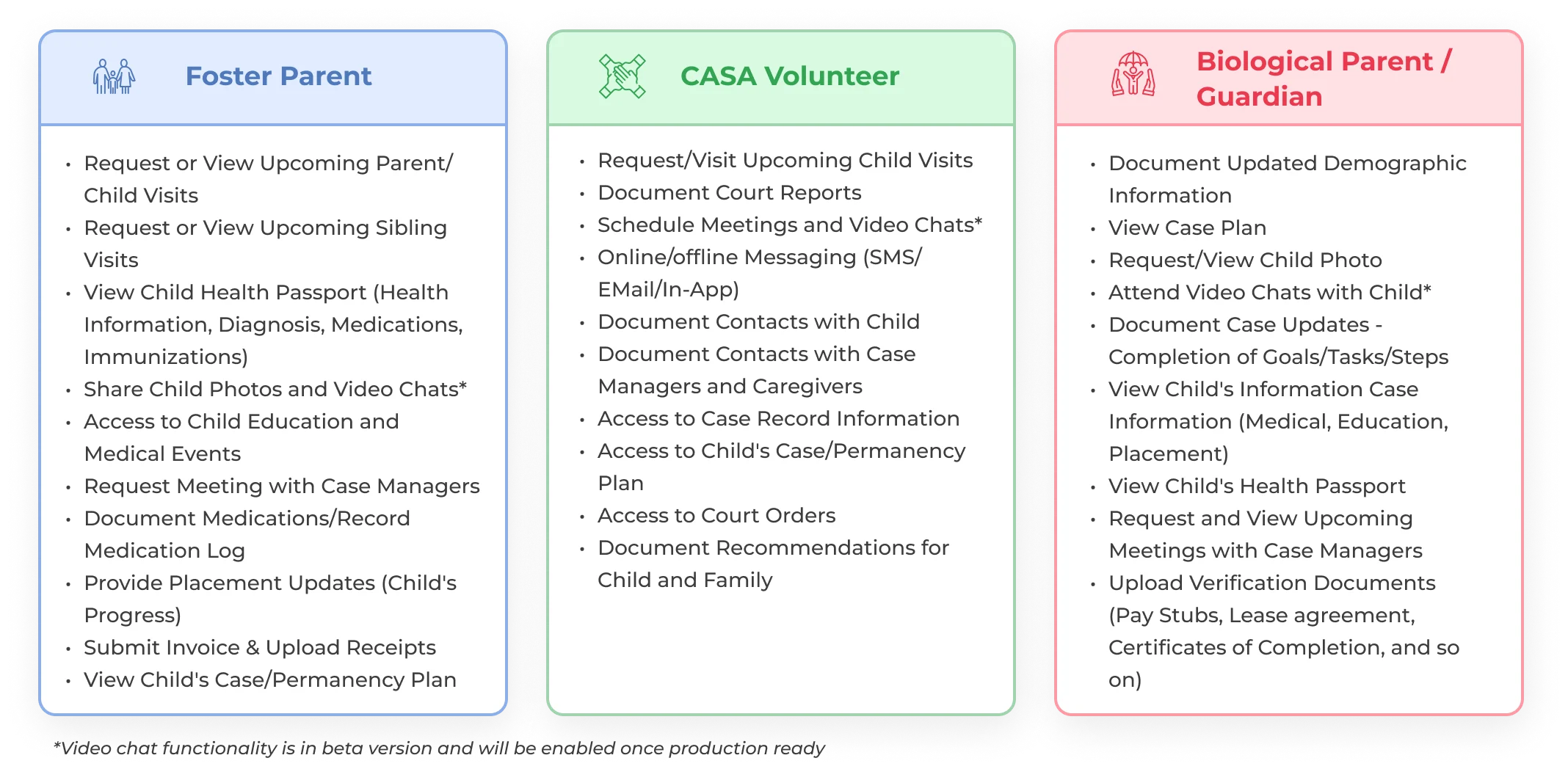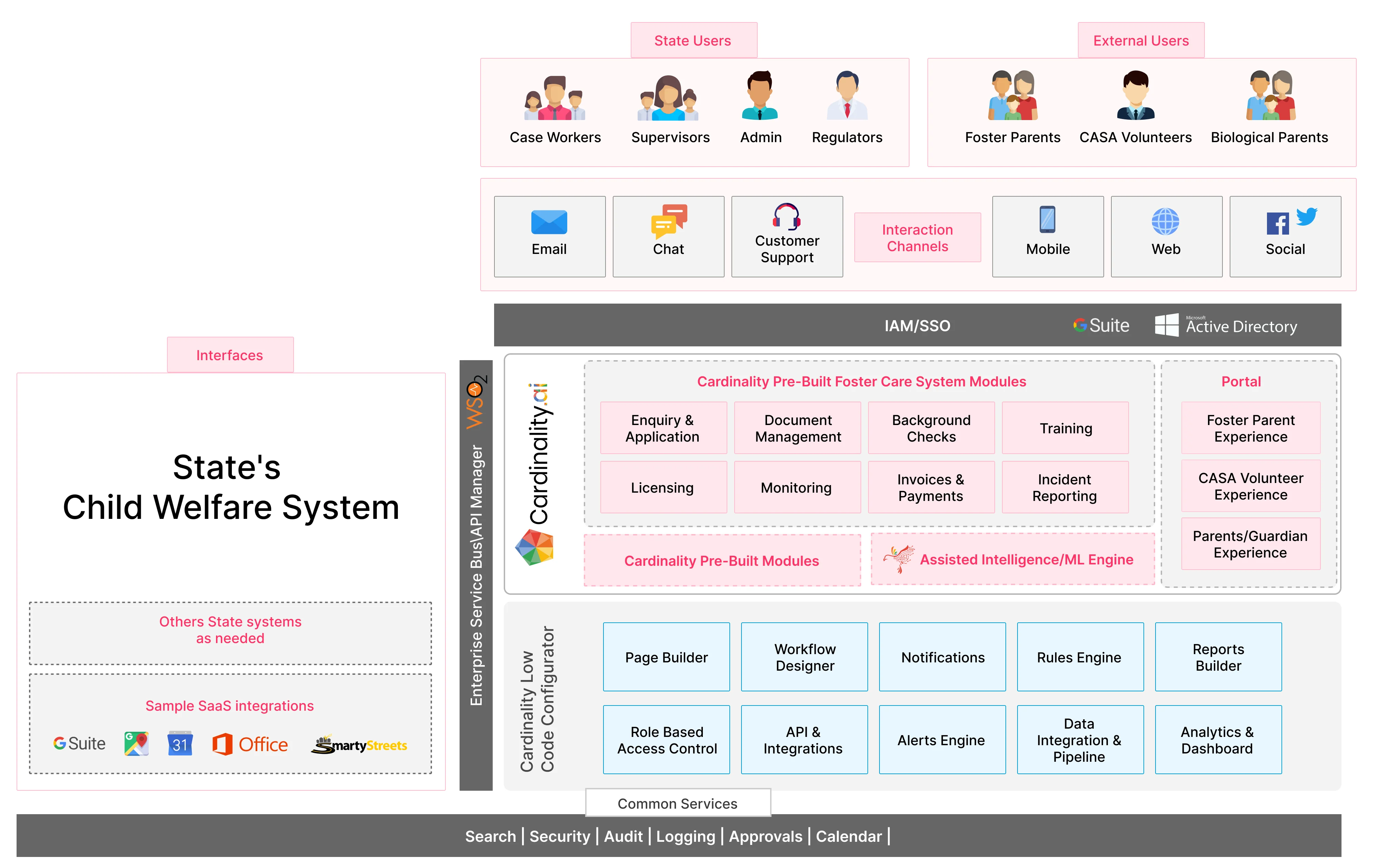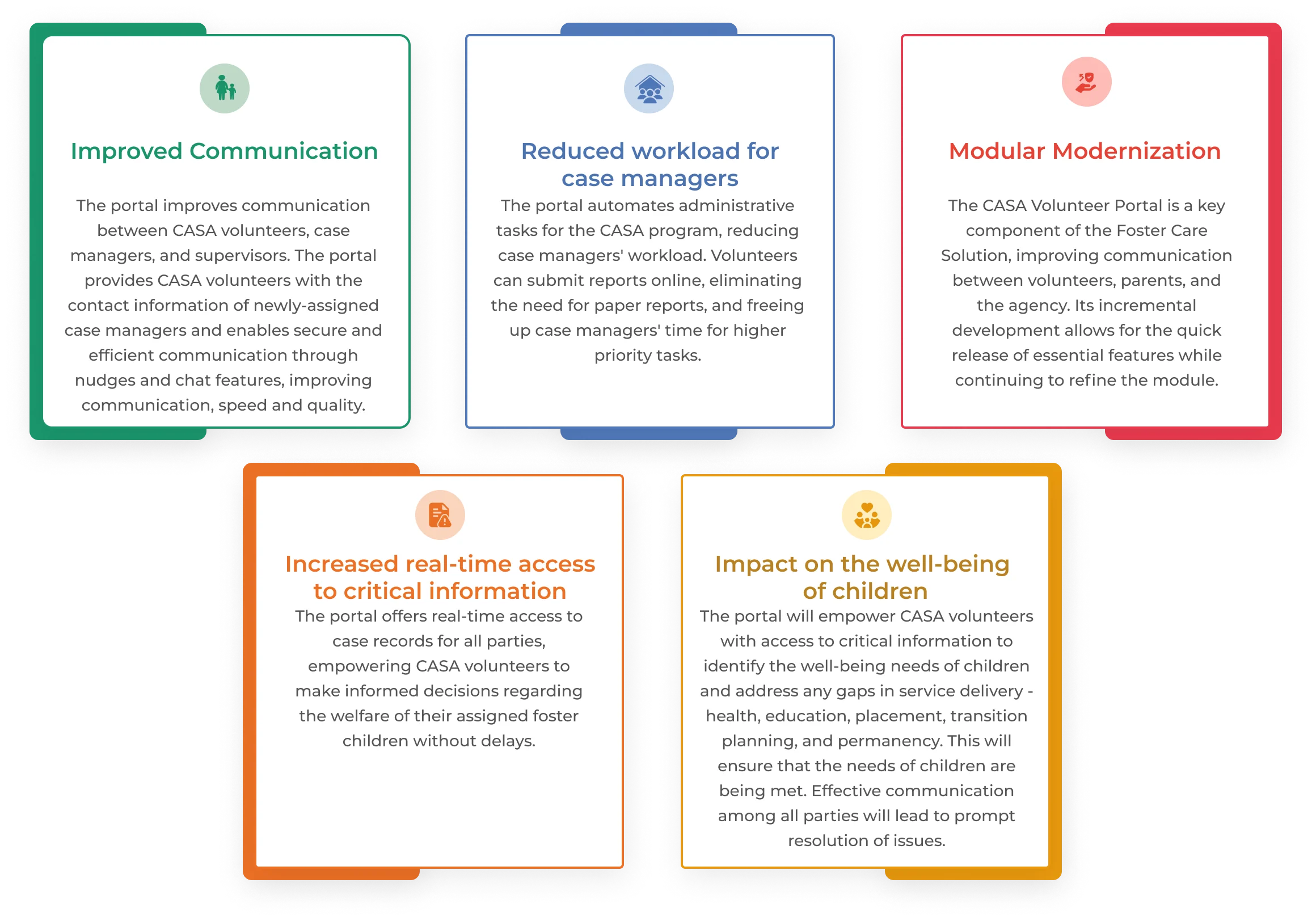
From Fragmented to Integrated: Improving Foster Children Continuum of Care



Wendy Wilson, Karrthik Shetty and Premkumar R
Aug 18, 2023
The Vital Role of CASA Volunteers in Child Welfare
Role of the Court-Appointed Special Advocate (CASA) volunteers is inevitable in the Child Welfare ecosystem. They work one-on-one with children in foster care, and represent the best interests of these children to the court. In the process, they need to communicate regularly with biological and foster parents, and CW Agency staff. In order to communicate effectively, they need to be equipped with the right technology.
A portal aimed to streamline communication and provide critical information about children in foster care, to improve CASA volunteers' work.
Communication and coordination with other stakeholders can be challenging and cause delays, missed appointments, and impact children's advocacy.
CASA volunteers work closely with case managers, foster parents, biological parents, and providers (support services and placement) to ensure the safety, well-being, and permanency needs of children are met and that they receive the best possible care and support.
This short white paper explores the various areas of system improvement, use-cases, Cardinality.ai’s solution, and the challenges and opportunities that lie ahead.
Addressing Hidden Bottlenecks in Business Processes
In the event of a CASA volunteer requiring to examine a child’s case file, he/she would have to visit the agency office, or depend upon the case manager to share the information via print/mail. The procedure is time-intensive for both agency and CASA, and there is a risk of data breach due to unencrypted emails, highlighting the need for a centralized and accessible system for all parties to access critical information.
Developing a portal with Role-Based Access Control (RBAC) is crucial to ensure each party only sees what they should see (as defined by the agency). Furthermore, the lack of secure communication channels with features such as chat, photo, and video sharing hinder collaboration and information sharing.
Self-Serve Portal
A dedicated mobile-friendly portal is needed to streamline work processes and communication between CASA, the agency, and other stakeholders, enabling fluid communication, collaboration, and video chats/meetings/visits. It facilitates building relationships amongst stakeholders. The portal will facilitate access to critical case information about the child, including medical/health, diagnoses, medication, education, placement, and other essential information. Additionally, it keeps everyone abreast of the status of a child and increases transparency.
The Portal will improve efficiency, save time, enhance security and access control, and allow ready access to information without the burden of photo-copying documents or sending emails. Without a new approach, the cost and impact of inaction will continue to grow, negatively affecting the well-being of children in foster care.
CardyFamily Child Welfare: Foster Care System & Self-Serve Portal
Cardinality offers a pre-built, fully-featured, and modern CCWIS solution, that is currently live statewide, in Maryland, and being implemented in Indiana and Wyoming. Our CCWIS solution includes a comprehensive out-of-the-box Foster Care Management System and Self-Serve Portal designed to meet the needs of different personas, such as CASA volunteers, biological parents, foster care providers, and others, who will need information and/or participate in the continuum of care for the child. The user experience, features, and data are managed by Role-Based Access Control (RBAC). This portal is intended to improve the overall efficiency and effectiveness of CASA volunteer programs.

Cardinality's Self-Serve Portal is part of a modular CCWIS Solution that can integrate securely with your agency’s system for bi-directional data exchange, enabling incremental modernization of the solution.

Core of the Architecture: Data Privacy, Protection, and Security
Cardinality’s CCWIS solution and the underlying platform have undergone AWS’s foundational technical review and implemented all necessary controls to become an AWS-qualified software and partner. Our solution is HIPAA and NIST compliant and has gone through all the preparatory steps to initiate FedRAMP authorization. Security and privacy controls are a key part of our architecture and by leveraging features like data encryption, API tokenization, RBAC, Anonymization, and so on, to meet all the necessary State and Federal compliance requirements.
Key Features
- Schedule Meetings and Video Calls
- Role-Based Access Control
- Mobile-Friendly and Offline Capabilities
- Multi-channel Notifications and Alerts
- Easy Integration and Interoperability
- Configurable and Easy to Maintain
Unlocking the Potential Benefits

Conclusion
Implementing a modern solution for information sharing and communication will benefit all parties involved in caring for the foster children. The solution will streamline the exchange of information, enabling informed decisions about the child's care and placement. The proposed Cardinality Self-Serve Portal is an initiative that will significantly improve communication and collaboration among stakeholders involved in the welfare of children.
Cardinality’s Child Welfare solution is being used statewide in Maryland since 2020 and it has helped Caseworkers become more efficient and drive better outcomes for vulnerable children.
- 16% increase in children receiving visits in the home from Caseworkers
- ~70% reduction in cases with recurrence of maltreatment for children
- 25% decrease in removal of child from home per 1,000 children even though overall increase in # of cases reported
- 22% reduction in re-entry in Foster Care system after reunification with family of origin





